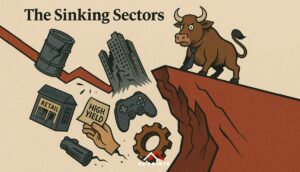Article

The recent announcement of store closures by Morrisons, one of the UK’s largest supermarket chains, has drawn significant attention. For many, this marks a troubling sign for the retail sector and may indicate a broader reflection of the current state of the UK economy. As Morrisons looks to close several locations, it becomes essential to consider the underlying factors driving these decisions and what this means for consumers, businesses, and investors alike. In this blog post, we will explore the causes behind these closures, the challenges facing the UK economy, and what the future may hold for both retail and investment sectors.
Morrisons Store Closures: What’s Happening?
Morrisons, like many traditional retailers, has faced increasing pressure from various forces in recent years. The company’s decision to close some of its stores is primarily aimed at reducing operational costs and improving profitability. Store closures are a standard business manoeuvre during times of financial strain. Still, the frequency of such closures has been on the rise in recent years, which indicates larger, more systemic issues within the UK economy.
Morrisons’ move to close stores is not solely about underperforming locations but also a response to changing consumer behaviour. With increased competition from online grocers, discount retailers, and rising operational costs, large supermarket chains are being forced to adapt. These closures are part of a broader strategy to optimize business operations and focus on more profitable locations and emerging market trends.
The State of the UK Economy: Rising Costs and Inflation
One of the main contributors to the closure of Morrisons stores is the increasing costs that retailers are facing, particularly in terms of labour, raw materials, and transportation. The UK economy has struggled with persistent inflation in recent years, and businesses across multiple sectors, including retail, are feeling the strain. The ongoing inflationary pressures have forced companies like Morrisons to re-evaluate their business models.
Rising energy costs, in part driven by global economic instability and higher labour costs, have had a direct impact on profit margins. For supermarkets, where margins are notoriously thin, these higher operational costs are unsustainable amidst stagnant wages and decreasing consumer spending power. As a result, Morrisons has had to take decisive actions like store closures to remain financially viable.
Changing Consumer Behaviour and the Shift Toward Online Shopping
Another major factor influencing the decision to close stores is the changing behaviour of UK consumers. More shoppers are shifting towards online grocery shopping, which has been growing steadily over the past decade. The convenience of ordering groceries from home, coupled with delivery services and click-and-collect options, has reduced the need for traditional in-store shopping.
Morrisons has responded by expanding its online offerings, but even this transition is not without its challenges. Online operations come with their own set of costs and logistics, and the competition in the e-commerce grocery market is fierce. Morrisons, along with other supermarkets, must navigate these digital shifts while maintaining a strong physical presence. However, given the challenges posed by rising costs and changing shopping habits, many traditional retail giants are finding it difficult to balance these two worlds effectively.
The Broader Implications: Employment and Local Economies
Store closures have far-reaching consequences beyond the immediate financial impact on Morrisons. For many workers, the closure of a local store means potential job losses or the need to relocate to other branches. While Morrisons has stated that it will strive to minimize the effects on its workforce through redeployment and support, the fact remains that retail job losses are a significant concern for the UK economy.
The closures also affect local economies, especially in smaller towns where supermarkets play a vital role in the economic ecosystem. A Morrisons store is often one of the largest employers in the area, and its closure can leave a gaping hole in the local job market. With fewer people visiting the area for shopping, local businesses—such as cafes, small retailers, and service providers—may also see a decline in footfall and sales. This ripple effect can exacerbate economic downturns in specific regions and result in further job losses and business closures.
The Rise of Discount Retailers and E-Commerce
While Morrisons and other traditional supermarkets are facing challenges, there has been a significant rise in discount retailers such as Aldi and Lidl. These chains are capitalizing on the current economic climate by offering lower prices, which appeal to consumers who are increasingly budget-conscious due to inflation and rising living costs.
Additionally, the continuous rise of online shopping has shifted a significant portion of retail activity away from physical stores. Consumers are now more likely to order groceries from their homes, where convenience and cost-effectiveness drive their decisions. Supermarkets like Morrisons have had to invest heavily in their digital capabilities to meet the demand for online shopping, but this move requires significant financial resources and strategic planning.
What Does This Mean for Investors?
For investors, the wave of store closures by Morrisons presents both challenges and opportunities. On one hand, investors in the retail sector should be cautious, as these closures indicate underlying weaknesses in the broader economy. The UK’s inflationary pressures, stagnant wages, and changing consumer behaviour are making it increasingly difficult for traditional retailers to maintain profitability.
On the other hand, for investors who are quick to adapt, opportunities exist in sectors that cater to the evolving preferences of consumers. The continued growth of discount retailers and e-commerce platforms presents viable investment prospects. Companies that can balance both physical and online retail operations are likely to outperform their counterparts that fail to evolve.
Additionally, for real estate investors, Morrisons’ closures could lead to an influx of vacant properties on the market. These vacant spaces might present opportunities for redevelopment, potentially transforming them into alternative uses such as offices, residential properties, or distribution centres to cater to the growing demand for e-commerce logistics.
Morrisons store closures serve as a reminder of the significant shifts occurring within the UK economy. Retail businesses are struggling with rising costs, changing consumer behaviour, and the growing dominance of e-commerce. While these closures are necessary for businesses to adapt, they also represent the broader economic challenges faced by the country.
For investors, staying informed about these changes is critical to making well-timed decisions. Retailers that successfully pivot to meet the demands of the modern consumer and embrace new technologies will likely thrive, while those that fail to adapt may face further store closures and financial decline. The ongoing evolution of the retail landscape offers both risks and rewards and understanding these trends is crucial for navigating the future of investment.
At De Pointe Research, we believe that understanding macroeconomic trends is key to making informed investment decisions. The current wave of Morrisons store closures highlights broader economic shifts that are reshaping not only the retail sector but also the entire UK economy. By staying ahead of these changes, investors can better position themselves for long-term success in an increasingly complex market.
Investment Strategies for Navigating Market Uncertainty
With volatility persisting, investors can adopt several strategies to safeguard their portfolios while maximizing potential gains.
1. Diversification Across Asset Classes
A well-diversified portfolio remains crucial in times of market uncertainty. Allocating assets across equities, bonds, commodities (such as gold), and alternative investments can help mitigate risks associated with a potential market downturn.
2. Defensive Stock Selection
Investors should consider defensive stocks—companies that tend to perform well regardless of economic conditions. These include:
- Consumer staples (Procter & Gamble, Coca-Cola)
- Healthcare companies (Pfizer, Johnson & Johnson)
- Utilities (Duke Energy, NextEra Energy) These sectors have historically provided stability during economic downturns due to their consistent demand.
3. Monitoring Economic Indicators
Keeping a close eye on inflation rates, employment data, and corporate earnings reports can provide valuable insights into market direction. If inflation remains stubbornly high, the Fed may delay rate cuts, which could suppress stock valuations.
4. Dollar-Cost Averaging (DCA) Approach
Investors can benefit from a Dollar-Cost Averaging (DCA) strategy, where they invest a fixed amount at regular intervals. This reduces the impact of short-term volatility and allows for gradual accumulation of assets at varying price points.
5. Considering Alternative Investments
Given current market conditions, alternative investments like gold, art, and private equity may provide a hedge against equity market fluctuations. Gold, in particular, has historically performed well during periods of inflation and economic uncertainty.
Long-Term Outlook for the S&P 500
Despite recent volatility, the S&P 500 remains a resilient index, backed by the fundamental strength of the U.S. economy and corporate earnings. Investors with a long-term perspective should recognize that periods of correction are natural and often present buying opportunities. The key lies in staying informed, maintaining a diversified portfolio, and adopting a disciplined investment strategy.
While 2025 presents both risks and rewards for S&P 500 investors, a strategic approach can help navigate uncertainty. By focusing on defensive stocks, monitoring economic indicators, and considering alternative investments, investors can better position themselves for success in an evolving market landscape.
At De Pointe Research, we remain committed to providing expert insights on alternative asset classes, helping investors make informed decisions beyond traditional markets. If you are interested in learning more about portfolio diversification strategies, feel free to explore our latest research.





